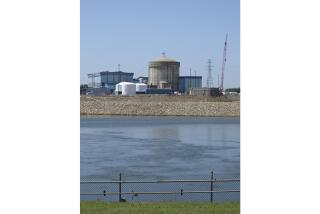Tons of coal ash spill into North Carolina river
- Share via
Tens of thousands of tons of coal ash have spilled into the Dan River from a closed North Carolina coal plant since Sunday, but drinking water supplies have not been affected, according to municipal officials and the plant’s owner, Duke Energy.
Between 50,000 and 82,000 tons of ash have poured into the Dan River, which flows between North Carolina and Virginia, Duke Energy said. Corporate officials, who blamed a broken storm water pipe, said Tuesday that the utility was still working to stop the leak at the Dan River Steam Station in Eden, N.C.
About 24 to 27 million gallons of basin water from a 27-acre coal ash reservoir at the retired plant also spilled into the river, Duke Energy said in a statement. The company said a temporary plug had stopped most of the coal ash flow, and crews were working to completely fix the leak. Crews were inserting a camera into the broken pipe to devise a long-term solution, the statement said.
A Duke Energy spokeswoman, Lisa Hoffmann, told the Los Angeles Times in a phone interview that municipal water supplies downstream had not been affected. She said Duke was working closely with Danville, Va., the nearest downstream city.
Danville has successfully treated the contaminated water, according to a statement on the city’s website.
“All water leaving our treatment facility has met public health standards,” Barry Dunkley, division director of water and wastewater treatment for Danville Utilities, said in a statement. “We do not anticipate any problems going forward in treating the water we draw from the Dan River.”
City officials in Eden, near the Virginia border, said the town’s water supplies were not affected because its intake valves were above the site of the leak.
The North Carolina Department of Environment and Natural Resources said it was testing samples of water upstream and downstream from the leak to determine whether water quality had been affected.
“Our chief concerns are that we do everything we can to assist in controlling this spill and assessing its damage,” said department secretary John Skvarla, who announced that he was on his way to the site Tuesday.
The Southern Environmental Law Center, which focuses on environmental issues in North Carolina, Virginia and four other Southern states, criticized Duke’s coal ash storage policies.
“It’s the latest in a series of spills and leaks into waterways, including drinking water reservoirs and upstream from drinking water uptakes, and groundwater,” Frank Holleman, a senior attorney at the center, said in statement. Holleman represents several environmental groups who have taken Duke Energy to court over the storage of coal ash, a byproduct of coal-fired energy plants.
“Storing large amounts of coal-related toxic substances in outdated earthen pits beside rivers and lakes is a recipe for repeated disasters and pollution,” Holleman said.
He said two other major utilities in North Carolina had agreed to move their coal ash out of unlined lagoons to dry landfill storage away from waterways. He also said Duke Energy had experienced coal ash structural failures at three of its other facilities in North Carolina.
In addition, the law center said contaminated water had been leeching for years from the coal ash containment basin at the Dan River plant, releasing arsenic, boron and sulfate into groundwater. The plant closed in 2012.
Speaking of the environmental groups that have criticized Duke Power, spokeswoman Hoffmann said, “They have good intentions but they are not presenting all of the facts.”
She said “coal ash issues” cited by the law center at three Duke plants in North Carolina were “small and had little public impact.”
Seepage is a common feature of coal ash storage basins but is minimal; state regulators have found that such seepage has had no effect on water quality at the Dan River plant, she said.
Duke Energy agrees that storing coal ash in lagoons is outdated, Hoffmann said. She said the company was working on developing methods using lined landfills to more safely store coal ash.
The utility is implementing those methods in some of its seven remaining coal-fired plants in North and South Carolina, she said.
Duke has closed seven other coal-fired plants, including the Dan River facility, Hoffmann said.
Duke Energy reported the Dan River plant leak to regulators and Danville officials as soon as it learned of the incident Sunday, Hoffman said. The company did not announce the leak to the general public until Monday.
david.zucchino@latimes.com
More to Read
Sign up for Essential California
The most important California stories and recommendations in your inbox every morning.
You may occasionally receive promotional content from the Los Angeles Times.










